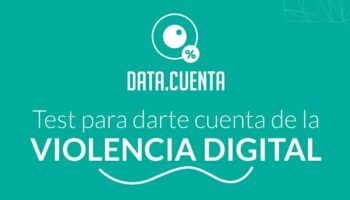Data.Cuenta: The online violence test
What happens when we stop seeing violence? But more importantly, what happens when we start to make it visible? That picture, that unwanted message from undesirable people, those controlling comments and the newest “love test” of sharing your passwords with your partner, are only forms of violence exercised through technology. Nowadays, we can perceive that the increase in digital and online violence directed towards women is evidenced in extortion, harassment and sexualization of threats; where the body is seen as a currency of “exchange” with entirely abusive purposes.
The Data.cuentaplataform seeks to make visible, count and measure the forms of violence that are mediated by technology and that are made invisible in everyday life. The platfom is part of the digital care training iniciatives that is mostly aimed at high school and university students, but is also completely open to the general public. It also provides a conceptual glossary regarding forms of violence, a directory of organizations, gropus and initiatives that offer legal, psychological and emotional support, as well as a series of legal recomedations within paraguayan legislation as well as international treaties.
Violence online, digital or from any technological mediation that is directed towards women reflects social practices that are directly related to misogynist-patriarchal cultural, political and educational models that account for a historicity built based on the reinforcement of the role of women being silenced in public and controlled in the private sphere.
In our article “The digital gender gap: addressing the challenge of a violence-free ecosystem” we mention the figures presented by The Guardian that reveals that about 70 million comments wirtten by woman, people with LGTBIQ identity and jews, suffered online harassment on a regular and consistent basis.
This platform also demonstrates the need to discuss education from a gender perspective, aiming for caring and co-responsible education. Likewise, it seeks to rethink ways that escape the instituted and anguished education that does not respond to the new challenges of today, where the processes of dialogic learning are no longer only found in classrooms and encyclopedias, but also in all social relations.
From TEDIC, and with Data. Cuenta, we seek to problematize what happens within the school frameworks through playful interactions such as a friendly-format survey, in order re-think about shared tactics to recognize, prevent and educate about the violence that is exercised in and from all spheres. It also invites to think about sexual and/or emotional relationships as safe spaces with joint care and not through quotas of power that violate both the privacy of people and their own personal development.
The platform also has a downloadable graphic material for printing and with free distribution under Creative Commons Licensing Recognition Share Alike 4.0 CC BY-SA 4.0, which can be shared openly. The platform is also in our Gitlab repository, where you can find open source in case you want to replicate it in your country.

